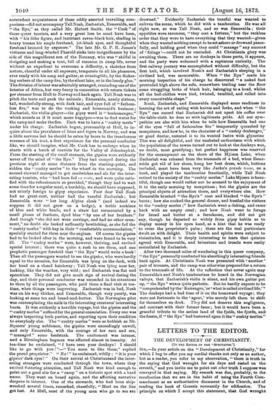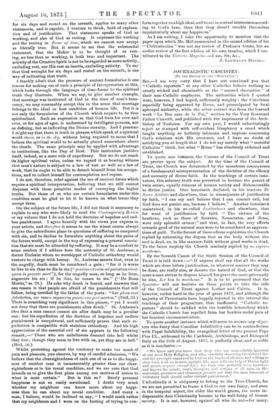LETTERS TO THE EDITOR.
THE DEVELOPMENT OF CHRISTIANITY.
[To MB EDITOR OF THR "Ell'ETA.TOR.1 Sin,—In your article on the "Development of Christianity," for which I beg to offer you my cordial thanks not only as an author, but as a reader, you refer to my observation, "there is truth in the saying that God wrought for six days and rested on the seventh," and you invite me to point out what truth I suppose was conveyed in that saying. My remark was due, probably, to the recollection that we are in the habit of using the Fourth Com- mandment as an authoritative document in the Church, and of reading the book of Genesis reverently for edification. The principle on which I accept this statement, that God wrought
for six days and rested on the seventh, applies to many other statements, and is capable, I venture to think, both of explana- tion and of justification. That statement speaks of God as working, and also of God as resting. It expresses the working and the resting in forms of time, which we cannot now accept as literally true. But it seems to me that the substantial statement, that the Maker is to be thought of as rest- ing, no less than as working, is both true and important. The activity of the Creative Spirit is not to be regarded as mere activity, excluding rest, nor His rest as inertia, excluding activity. To say that God wrought for six days and rested on the seventh, is one way of indicating that truth. I frankly admit that the pressure of ancient formularies is one reason for making use of such a principle of interpretation as this, which looks through the language of time-forms to the spiritual truth they illustrate. When we say, to give another example, that marriage was instituted of God in the time of man's inno- cency, we may reasonably accept this in the sense that marriage belongs to the ideal or best condition of human life. But it is not only the formularies of the Church which require to be thus spiritualised. Such an expression as that God lives for ever and ever, or for ages of ages, is understood by intelligent persons, not as defining, but as indicating the Divine eternity. And I presume I might say that there is truth in phrases which speak of a spiritual world above, or in the sky, without being required to mean that I believe the spiritual world to be actually placed somewhere above the clouds. The same principle may be applied with advantage to institutions, like the Day of Rest. ' This institution justifies itself, indeed, as a mere rule of expediency. But we do not reach its higher spiritual value, unless we regard it as bearing witness that man's nature is subject to a law of rest as well as a law of work, that he ought to be able to detach himself from his occupa- tions, and to collect himself for contemplation and repose.
I do not, therefore, rebel against the use of ancient forms which require a spiritual interpretation, believing that we still cannot dispense with these primitive modes of conveying the higher truths. But those of us who use certain formularies under this condition must be glad to let it be known on what terms they accept them.
On the subject of the future life, I did not think it necessary to explain to any who were likely to read the Contemporary Review or my volume that I do not hold the doctrine of hopeless and end- less punishment. I agree heartily with the views you express in your article, and therefore it seems to me the wisest course always to give the subordinate place to questions of suffering as compared with sin, and to decline to formulate anything about the pains of the future world, except in the way of expressing a general convic- tion that sin must be attended by suffering. It may be a comfort to some readers if I adduce here the authority of St. Ambrose, a doctor Ecclesim whom no worshipper of Catholic orthodoxy would venture to charge with heresy. _St. Ambrose asserts that, even to the ungodly, death must be considered a gain ; "for it is worse to live to sin than to die in sin ("gravies est enim ad peccatamvivere Team in peccato ntori"), for the ungodly man, so long as be lives, augments his sin ; if he dies, he ceases to sin." ("De Bono Mortis," as. 28.) He asks why death is feared, and answers that one reason is that people are afraid of the punishments that will follow, being terrified by the fables of the poets : "htec plena sent fabulatian, nec tamen negaverim ptenas esse post mortem." (Ibid, 33.) There is something very significant in this phrase, "yet I would not deny that there are punishments after death." St. Ambrose's idea that a man cannot cannot sin after death may be a peculiar one ; but his repudiation of the doctrine of hopeless and endless punishment is unequivocal, and sufficiently proves that such re- pudiation is compatible with stainless orthodoxy. And his high appreciation of the essential evil of sin appears in the following remark,—" Those who are unbelievers descend into hell whilst they live ; though they seem to live with us, yet they are in hell." (Ibid, .56.)
Whilst protesting against the tendency to make too much of pain and pleasure, you observe, by way of candid admission, "We believe that the clearsightedness of each one of us as to the happi- ness of another man is immeasurably greater than our clear- sightedness as to his moral condition, and we are sure that God intends us to give the first place among our motives of action to what is most certain." But is this so ? Surely personal happiness is not so easily scrutinised. I doubt very much whether my neighbour can know more about my happi- ness than he can about my moral condition. And many a man, I believe, would be inclined to say, "I would much rather
that my neighbours and I were on the footing of trying to con-
form together to .a high ideal, and to act in mutual intercourse accord- ing to God's laws, than that they should trouble themselves inquisitorially about my happiness."
As I am writing, I take the opportunity to mention that the paper upon which Mr. Mill commented in the second edition of his " Utilitarianism " was not my review of Professor Grote, but an earlier review of the first edition of his owu treatise, which I con tributed to the Victoria 411agazine.—I am, Sir, &c., J. LLEWELYS DAVIE:.































 Previous page
Previous page